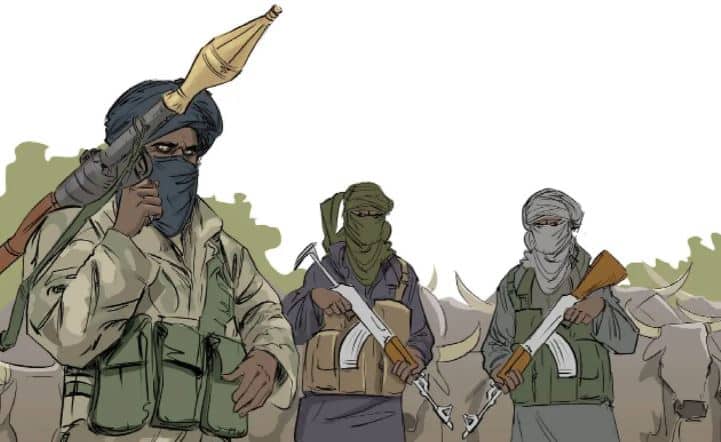
A newly-emerged militant faction known as the Mahmuda Group has reportedly seized control of several rural areas across Nigeria’s North Central region, particularly in the vicinity of Kainji Lake National Park (KLNP), which stretches across parts of Kwara and Niger States.
According to local sources, the group has established a strong presence in various communities within Kaiama Local Government Area of Kwara State—specifically in Kemaanji, Tenebo, Baabete, Nuku, and Nanu.
Their influence also extends to villages within the Yashikira District in Baruten LGA. In Niger State, the militants are active in Babana and Wawa districts located in Borgu LGA.
On Wednesday, reports emerged that the group launched a brutal assault on a local vigilante team in Kemaanji, resulting in the deaths of more than 15 vigilantes and residents.
“Their leader, in a voice recording circulated among villagers, issued threats to several communities,” a local informant told SaharaReporters. “They kill, abduct people, and demand huge ransoms.”
Militants Exploit National Park’s Vast Unprotected Territory
Kainji Lake National Park, once a refuge for hunters, fishermen, and loggers, has now become a sanctuary for the Mahmuda group. Taking advantage of its expansive and largely unmonitored terrain, the group has entrenched itself deeply, operating freely without significant government resistance.
Initially, the group clashed with local loggers and vigilante forces, but they eventually struck an agreement. Loggers are now allowed to continue their activities in exchange for fees and levies paid to the militants—a major source of funding for the group’s operations.
A History of Movement and Growing Influence
Eyewitnesses say the group first appeared over five years ago, following their violent takeover of park territory and the displacement of park rangers. Their origins reportedly trace back to Mokwa LGA, from where they were driven out during the administration of former Niger State Governor Muazu Babangida Aliyu, who accused them of having ties to Boko Haram.
After being forced from Mokwa, the militants moved to Welele in Kaiama LGA but were again evicted by security operations. They later re-emerged in the heart of Kainji Lake National Park—this time with greater firepower and better coordination.
Though some locals believe the group may have connections with extremist factions in neighboring Benin or Niger Republic, others speculate that they are a splinter group of Boko Haram. A recently leaked audio recording suggests they identify as moderate Sunni Islamists and refer to themselves as the Mahmuda or Mallam group, named after their leader.
Militant Rule: An Alternative Authority
The militants communicate primarily in Hausa and have reportedly implemented a strict system of governance across communities under their control. Daily life is now governed by their rules:
- Pastoralists must pay zakat (Islamic alms) to graze livestock.
- Farmers receive land allocations from the militants in return for mandatory levies.
- Villagers are coerced into working on farms controlled by the group.
- Kidnapping remains rampant, with victims often held until ransom is paid.
- Social conduct is strictly monitored—drinking, smoking, and road travel are all regulated by militant enforcers.
- Herbalists suspected of aiding vigilantes are threatened or attacked.
- Illegal mining has also been linked to the group’s economic activities.
In an effort to legitimize their control, the Mahmuda group reportedly conducts religious preaching sessions within local communities, urging villagers to pledge loyalty to them instead of the Nigerian government. They have also stepped into the role of arbiters, settling disputes among locals to further solidify their influence.
Locals Caught Between Fear and Survival
The absence of strong government intervention has left many communities to fend for themselves. Some local vigilante groups, facing heavy casualties and lacking resources, have reportedly entered uneasy alliances with the militants to facilitate the release of kidnapped individuals.
“The Mahmuda group has pushed out other bandits in the area,” one resident stated. “Those who collaborated with rival groups were either abducted for ransom or killed outright.”
While the origin of the militants’ advanced weaponry remains unknown, many villagers suspect that higher powers may be aware of—or even complicit in—the group’s continued presence.
“There’s a growing belief that those in authority know about them,” said one source. “Whether anything will be done about it remains to be seen.”





